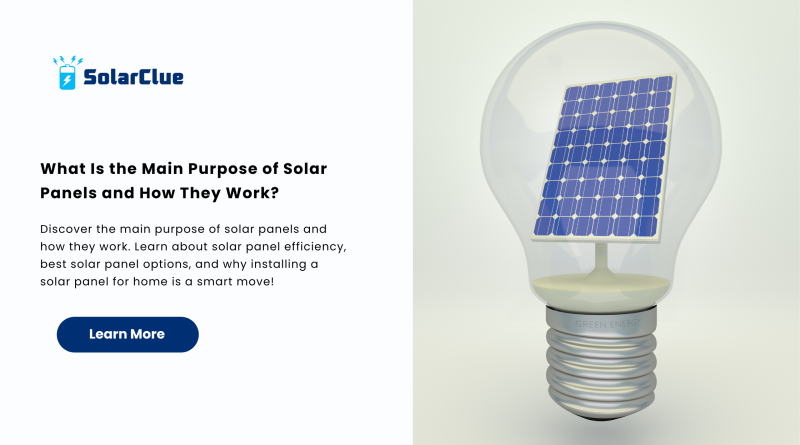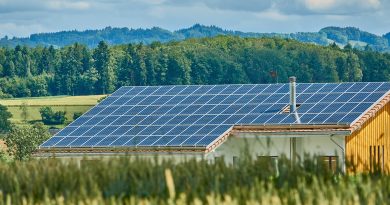What Is the Main Purpose of Solar Panels and How They Work?
When we hear about solar panels, we immediately think of clean energy and lower electricity bills. But what exactly is the purpose of solar panels, and how do they work to provide us with renewable energy? In this blog, we will dive deep into the real function of solar panels, how they operate, and why they are becoming the top choice for homeowners around the world. If you’re considering investing in the best solar panel options, this guide will answer all your questions!
Table of Contents
- 1 How Solar Panels Work: A Simple Explanation
- 2 What Materials Are Used in Solar Panels?
- 3 Main Purpose of Solar Panels: Why They’re Essential Today
- 4 Understanding Solar Panel Efficiency
- 5 Why Install a Solar Panel for Home?
- 6 How to Choose the Best Solar Panel for Your Needs
- 7 Best Solar Panels for Your Home: Top Picks
- 8 Installation Process: What to Expect
- 9 Cost and Savings with Solar Panels
- 10 Maintenance Tips for Long-Lasting Solar Panels
- 11 Environmental Impact of Solar Panels
- 12 Myths About Solar Panels Debunked
- 13 Future of Solar Panel Technology
- 14 Conclusion: Why Solar Panels Are the Future
- 15 FAQs
How Solar Panels Work: A Simple Explanation
The primary job of solar panels is to capture sunlight and convert it into usable electricity. They are made up of photovoltaic (PV) cells that absorb sunlight and create an electric current through the photovoltaic effect. Each solar panel is a collection of these cells, working together to produce enough power to run home appliances, lights, and more. The energy created is direct current (DC), which is then converted into alternating current (AC) using an inverter, making it usable for our homes and businesses.
What Materials Are Used in Solar Panels?
Most solar panels are made from silicon, a material known for its conductivity and efficiency. High-quality silicon enhances solar panel efficiency, allowing the panels to capture more sunlight and produce more electricity. Some panels also use thin-film technology, although silicon remains the most popular material in residential and commercial setups.
Main Purpose of Solar Panels: Why They’re Essential Today

The core purpose of a solar panel is to provide a sustainable, eco-friendly, and cost-effective source of energy. As global concerns about climate change grow, solar panels offer a way to reduce carbon footprints while enjoying substantial savings on electricity bills. By switching to solar panel for home setups, you also support energy independence and decrease reliance on non-renewable resources.
Understanding Solar Panel Efficiency
Solar panel efficiency measures how well a panel converts sunlight into usable electricity. Higher efficiency means more energy production in a smaller area, which is crucial if you have limited roof space. Today’s top brands offer efficiencies ranging from 15% to over 22%. Choosing panels with higher solar panel efficiency means you can maximize your energy savings and get quicker returns on your investment.
Why Install a Solar Panel for Home?
Installing a solar panel for home isn’t just about saving money; it’s about securing a brighter future. Residential solar panels allow homeowners to take control of their energy usage, enjoy tax benefits, and even sell excess electricity back to the grid in some areas. Plus, homes equipped with solar panels often see an increase in property value.
How to Choose the Best Solar Panel for Your Needs
Selecting the best solar panel involves considering factors like efficiency, warranty, durability, and cost. Look for panels with a proven track record and strong reviews. Brands that provide a long warranty period typically offer better reliability. Visit SolarClue.com to explore some of the leading options available in the market today!
Best Solar Panels for Your Home: Top Picks
When it comes to the best solar panels for your home, there are several excellent choices. Monocrystalline panels are often recommended because of their high solar panel efficiency and sleek design. Polycrystalline panels offer a more budget-friendly option, while still providing good performance. To find detailed comparisons, check out our latest insights at Blog.SolarClue.com!
Installation Process: What to Expect
The process begins with an evaluation of your property, followed by system design, obtaining permits, and finally installation. Professional installers ensure that the panels are positioned optimally to capture maximum sunlight throughout the day.
Cost and Savings with Solar Panels
While the initial investment can seem high, government incentives, tax credits, and declining equipment costs make installing solar panels more affordable than ever. Most homeowners see a complete return on their investment within 5–8 years and enjoy decades of free energy afterward.
Maintenance Tips for Long-Lasting Solar Panels
Maintaining solar panels is relatively easy. Regular cleaning to remove dirt and debris, as well as annual professional inspections, ensures that your system performs at its best for years.
Environmental Impact of Solar Panels
Switching to solar panels dramatically reduces greenhouse gas emissions. By installing a solar panel for home, you contribute to a cleaner, greener planet, lessening dependence on fossil fuels.
Myths About Solar Panels Debunked
Many people believe that solar panels don’t work on cloudy days or that they are too expensive. In reality, panels can generate power even under cloud cover, and the cost of going solar has dropped by over 70% in the last decade.
Future of Solar Panel Technology
As research progresses, the future of solar panels looks bright. Innovations like bifacial panels and perovskite cells promise even greater solar panel efficiency and affordability in the years to come.
Conclusion: Why Solar Panels Are the Future
In conclusion, solar panels are not just an alternative energy source—they are a smart, sustainable investment in our future. Whether you’re looking for the best solar panel or simply want to understand the benefits, embracing solar energy means stepping into a brighter tomorrow. Visit SolarClue.com to find the perfect solar panel for home setup, and for more expert advice, be sure to check out Blog.SolarClue.com! Let’s power the future, together.
FAQs
1. How long do solar panels last?
Most solar panels last between 25 to 30 years with proper maintenance.
2. Do solar panels work during cloudy days?
Yes, solar panels can still generate electricity even on cloudy or rainy days, although their efficiency might be reduced.
3. What is the most efficient type of solar panel?
Monocrystalline solar panels currently offer the highest solar panel efficiency among commercial products.
4. Is it worth getting a solar panel for home?
Absolutely! Installing a solar panel for home can save you money on energy bills, increase property value, and help the environment.
5. What maintenance is needed for solar panels?
Cleaning the panels a few times a year and scheduling annual inspections are usually sufficient to maintain peak performance.


